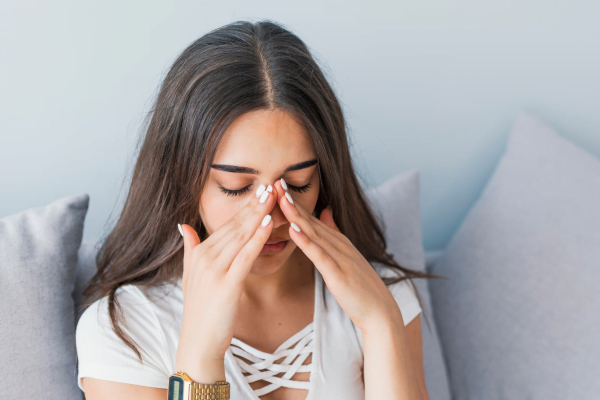Sinus headaches can be exceedingly debilitating, causing pain, pressure, and discomfort in areas like the forehead, cheeks, and around the eyes. While medications can bring relief, natural remedies also offer effective solutions.
Natural Tips for Relieving Sinus Headaches
Here are ten natural tips to help ease your sinus headaches:
Stay Hydrated
Hydration is crucial for thinning mucus, which aids in its drainage from your sinuses. Aim to drink at least eight glasses of water daily to keep your nasal passages moist and decrease congestion.
Use Steam Therapy
Inhaling steam can unclog congestion and relieve sinus pressure. Add a few drops of essential oils such as eucalyptus or peppermint to hot water, cover your head with a towel, and inhale the steam for 5-10 minutes for immediate relief and improved sinus drainage.
Get a Humidifier
Utilizing a humidifier at home can add moisture to the air, preventing your nasal passages from drying out and worsening sinus headaches. A cool-mist humidifier is particularly beneficial during dry seasons or in heated indoor environments.
Apply Warm Compresses
Using a warm compress on your face can relieve sinus pain and support drainage. Soak a washcloth in warm water, wring it out, and place it over your forehead, cheeks, and nose for 5-10 minutes to find relief.
Try Nasal Irrigation
Saline nasal irrigation can clear out mucus and allergens from your nasal passages, providing relief from sinus congestion and headaches. Use a saline nasal spray or a neti pot with a saline solution for this process.
Enhance Air Quality
Indoor pollutants like dust, pet dander, and mold can aggravate sinus symptoms. Keep your living space clean, dust-free, and well-ventilated to boost air quality and reduce sinus irritation.
Avoid Known Triggers
Identify and avoid triggers that can worsen your sinus headaches, such as cigarette smoke, strong odors, allergens, and environmental pollutants. Reducing exposure to these elements can help prevent sinus inflammation and pain.
Practice Relaxation Techniques
Stress can exacerbate sinus headaches by causing muscle tension and increasing inflammation. Incorporate relaxation techniques like deep breathing, meditation, yoga, or tai chi to mitigate stress and alleviate symptoms.
Stay Active
Regular physical activity can enhance circulation and promote sinus drainage, reducing the frequency and severity of sinus headaches. Aim for at least 30 minutes of moderate exercise on most days for these benefits.
Get Enough Rest
Ensuring adequate rest is vital for supporting your immune system and promoting healing. Aim for 7-9 hours of quality sleep every night to help your body combat infections and reduce sinus inflammation.
Foods to Relieve Sinus Headaches
Proper nutrition is essential for managing sinus headaches. Certain foods can provide relief by reducing inflammation and aiding sinus drainage. Spicy foods like chili peppers, garlic, and onions contain compounds that help clear nasal congestion. Citrus fruits rich in vitamin C can boost the immune system and help fight sinus infections.
Both ginger and turmeric are renowned for their anti-inflammatory properties. Bromelain, found in pineapple, can help decrease sinus swelling. Additionally, Omega-3-rich foods like salmon, and green leafy vegetables such as spinach, offer further anti-inflammatory benefits, supporting overall sinus health.
Incorporate these foods into your diet to help alleviate sinus headache symptoms and promote sinus health. Stay hydrated and avoid trigger foods while monitoring your body’s reactions. For persistent or severe symptoms, consult a healthcare professional for comprehensive sinus headache management.
Frequently Asked Questions (FAQs)
Should I Use a Cold or Warm Compress for Sinus Headaches?
Your preference and specific symptoms will dictate whether a cold or warm compress is best for a sinus headache. A cold compress can reduce inflammation and numb the area, relieving pain and swelling. Conversely, a warm compress can ease discomfort, foster sinus drainage, and reduce pressure. Experiment with both methods to determine which is more effective for you.
How Can I Prevent Sinusitis Headaches?
Preventing sinusitis headaches involves maintaining good sinus health and minimizing factors that trigger sinus inflammation. Stay hydrated, practice good hygiene by frequently washing your hands, avoid allergens and pollutants, and maintain a clean, dust-free environment. Using a humidifier, practicing nasal irrigation, and effectively managing allergies can also help prevent sinusitis headaches.
How to Sleep with a Sinus Headache
Sleeping with a sinus headache can be challenging, but several strategies can enhance comfort. Elevate your head with an extra pillow to foster sinus drainage and lessen congestion. Use a humidifier in your bedroom to keep the air moist and combat nasal dryness. Applying a warm compress to your forehead or using aromatherapy with essential oils like lavender can also promote relaxation and improve sleep quality.
Why Do I Get Sinus Headaches at Night?
Sinus headaches at night may result from atmospheric pressure changes, daytime allergen exposure, or an increase in sinus congestion when lying down. Pooling sinus drainage in the sinuses while lying flat can increase pressure and discomfort. Controlling allergies, avoiding triggers before bedtime, and using sinus-relieving techniques like steam inhalation before sleep can help reduce nighttime sinus headaches. If these headaches persist, consult a healthcare professional for further evaluation and treatment options.
